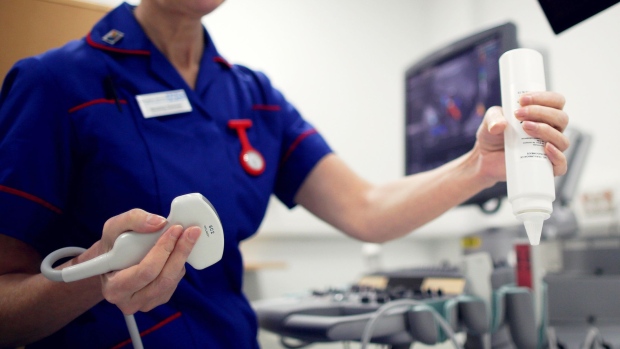Jan 22, 2020
U.K. Government Spending Soars as Austerity Continues to Thaw
, Bloomberg News

(Bloomberg) -- Want the lowdown on European markets? In your inbox before the open, every day. Sign up here.
U.K. Chancellor of the Exchequer Sajid Javid presided over the continued easing of austerity last month as departmental spending rose at its fastest pace for any December since 2003.
The 10.5% increase from a year earlier came as the government pumped money into pay rises in the state-run National Health Service. It rose 5% in the first nine months of the fiscal year, the most for the period since records began in 1997.
The boost left borrowing between April and December at 54.6 billion pounds ($71.3 billion), up 8% from a year earlier, the Office for National Statistics said Wednesday. The deficit in December alone narrowed slightly to 4.8 billion pounds, thanks to solid revenue growth and a fall in net investment.
The pound was little changed after the data were published and was trading at $1.3057 as of 9:35 a.m. in London.
Britain is loosening the purse strings after almost a decade of budget cutting that has brought down the deficit to under 2% of economic output from 10% in the aftermath of the financial crisis.
The thaw began in 2018 when Theresa May, facing a public backlash, announced a long-term settlement for the NHS. The process has gathered pace under Javid, who pledged the biggest increase in day-to-day spending in 15 years ahead of the general election. A further boost will come in the March 11 budget, though the focus will be spending on investment rather than current spending or big tax reductions.
New fiscal rules allow Javid to borrow an extra 20 billion pounds or so a year for capital spending, funded by ultra-low interest rates, but limit his room for maneuver elsewhere.
The current budget, which excludes investment, is meant to be in balance in three years under the rules and Javid is now on course to meet that target by thinnest of margins.
Prime Minister Boris Johnson led the Conservatives to an emphatic election victory and the budget will almost certainly deliver on his promise of a modest tax cut for most workers.
Javid wants to boost investment in areas such as broadband and transport to boost productivity and shore up the economy as Britain prepares to leave the European Union on Jan. 31. Much of it may go poorer parts of northern and central England, where pro-Brexit voters abandoned Labour for the Conservatives.
(Adds pound in fourth paragraph.)
--With assistance from Jill Ward.
To contact the reporter on this story: David Goodman in London at dgoodman28@bloomberg.net
To contact the editors responsible for this story: Fergal O'Brien at fobrien@bloomberg.net, Andrew Atkinson
©2020 Bloomberg L.P.